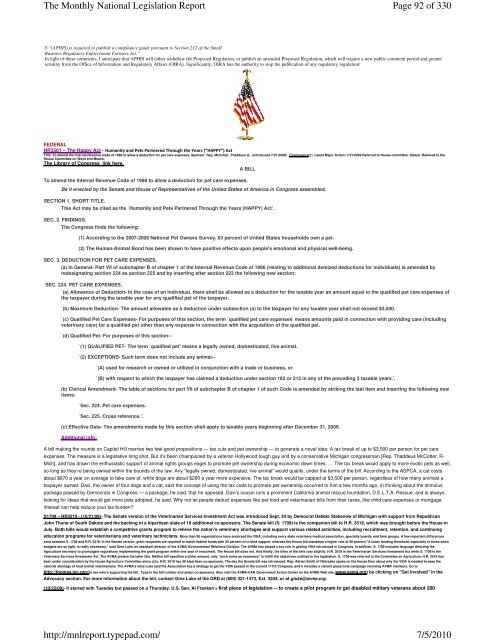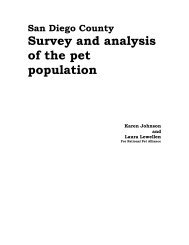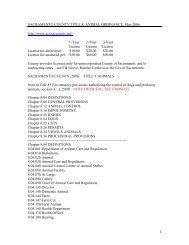<strong>The</strong> <strong>Monthly</strong> <strong>National</strong> <strong>Legislation</strong> <strong>Report</strong>http://mnlreport.typepad.com/<strong>Page</strong> 92 <strong>of</strong> <strong>330</strong>7/5/<strong>2010</strong> “(APHIS) is required to publish a compliance guide pursuant to Section 212 <strong>of</strong> the SmallBusiness Regulatory Enforcement Fairness Act.”In light <strong>of</strong> these comments, I anticipate that APHIS will either withdraw the Proposed Regulation, or publish an amended Proposed Regulation, which will require a new public comment period and greaterscrutiny from the Office <strong>of</strong> Information and Regulatory Affairs (OIRA). Significantly, OIRA has the authority to stop the publication <strong>of</strong> any regulatory regulation!FEDERALHR3501 – <strong>The</strong> Happy Act - Humanity and Pets Partnered Through the Years (“HAPPY”) ActTitle: To amend the Internal Revenue Code <strong>of</strong> 1986 to allow a deduction for pet care expenses. Sponsor: Rep. McCotter, Thaddeus G. (introduced 7/31/2009) Cosponsors(1) Latest Major Action: 7/31/2009 Referred to House committee. Status: Referred to theHouse Committee on Ways and Means.<strong>The</strong> Library <strong>of</strong> Congress link here.A BILLTo amend the Internal Revenue Code <strong>of</strong> 1986 to allow a deduction for pet care expenses.Be it enacted by the Senate and House <strong>of</strong> Representatives <strong>of</strong> the United States <strong>of</strong> America in Congress assembled,SECTION 1. SHORT TITLE.This Act may be cited as the `Humanity and Pets Partnered Through the Years (HAPPY) Act'.SEC. 2. FINDINGS.<strong>The</strong> Congress finds the following:(1) According to the 2007-2008 <strong>National</strong> Pet Owners Survey, 63 percent <strong>of</strong> United States households own a pet.(2) <strong>The</strong> Human-Animal Bond has been shown to have positive effects upon people's emotional and physical well-being.SEC. 3. DEDUCTION FOR PET CARE EXPENSES.(a) In General- Part VII <strong>of</strong> subchapter B <strong>of</strong> chapter 1 <strong>of</strong> the Internal Revenue Code <strong>of</strong> 1986 (relating to additional itemized deductions for individuals) is amended byredesignating section 224 as section 225 and by inserting after section 223 the following new section:`SEC. 224. PET CARE EXPENSES.`(a) Allowance <strong>of</strong> Deduction- In the case <strong>of</strong> an individual, there shall be allowed as a deduction for the taxable year an amount equal to the qualified pet care expenses <strong>of</strong>the taxpayer during the taxable year for any qualified pet <strong>of</strong> the taxpayer.`(b) Maximum Deduction- <strong>The</strong> amount allowable as a deduction under subsection (a) to the taxpayer for any taxable year shall not exceed $3,500.`(c) Qualified Pet Care Expenses- For purposes <strong>of</strong> this section, the term `qualified pet care expenses' means amounts paid in connection with providing care (includingveterinary care) for a qualified pet other than any expense in connection with the acquisition <strong>of</strong> the qualified pet.`(d) Qualified Pet- For purposes <strong>of</strong> this section--`(1) QUALIFIED PET- <strong>The</strong> term `qualified pet' means a legally owned, domesticated, live animal.`(2) EXCEPTIONS- Such term does not include any animal--`(A) used for research or owned or utilized in conjunction with a trade or business, or`(B) with respect to which the taxpayer has claimed a deduction under section 162 or 213 in any <strong>of</strong> the preceding 3 taxable years.'.(b) Clerical Amendment- <strong>The</strong> table <strong>of</strong> sections for part VII <strong>of</strong> subchapter B <strong>of</strong> chapter 1 <strong>of</strong> such Code is amended by striking the last item and inserting the following newitems:`Sec. 224. Pet care expenses.`Sec. 225. Cross reference.'.(c) Effective Date- <strong>The</strong> amendments made by this section shall apply to taxable years beginning after December 31, 2009.Additional info:A bill making the rounds on Capitol Hill marries two feel-good propositions — tax cuts and pet ownership — to generate a novel idea: A tax break <strong>of</strong> up to $3,500 per person for pet careexpenses. <strong>The</strong> measure is a legislative long shot. But it’s been championed by a veteran Hollywood tough guy and by a conservative Michigan congressman [Rep. Thaddeus McCotter, R-Mich], and has drawn the enthusiastic support <strong>of</strong> animal rights groups eager to promote pet ownership during economic down times. … <strong>The</strong> tax break would apply to more exotic pets as well,so long as they’re being owned within the bounds <strong>of</strong> the law. Any “legally owned, domesticated, live animal” would qualify, under the terms <strong>of</strong> the bill. According to the ASPCA, a cat costsabout $670 a year on average to take care <strong>of</strong>, while dogs are about $200 a year more expensive. <strong>The</strong> tax break would be capped at $3,500 per person, regardless <strong>of</strong> how many animals ataxpayer owned. Davi, the owner <strong>of</strong> four dogs and a cat, said the concept <strong>of</strong> using the tax code to promote pet ownership occurred to him a few months ago, in thinking about the stimuluspackage passed by Democrats in Congress — a package, he said, that he opposed. Davi’s cousin runs a prominent California animal rescue foundation, D.E.L.T.A. Rescue, and is alwayslooking for ideas that would get more pets adopted, he said. Why not let people deduct expenses like pet food and veterinarian bills from their taxes, like child care expenses or mortgageinterest can help reduce your tax burden?S1709 – HR3519 - (10/21/09)- <strong>The</strong> Senate version <strong>of</strong> the Veterinarian Services Investment Act was introduced Sept. 24 by Democrat Debbie Stabenow <strong>of</strong> Michigan with support from RepublicanJohn Thune <strong>of</strong> South Dakota and the backing <strong>of</strong> a bipartisan slate <strong>of</strong> 19 additional co-sponsors. <strong>The</strong> Senate bill (S. 1709) is the companion bill to H.R. 3519, which was brought before the House inJuly. Both bills would establish a competitive grants program to relieve the nation's veterinary shortages and support various related activities, including recruitment, retention, and continuingeducation programs for veterinarians and veterinary technicians. More than 90 organizations have endorsed the VSIA, including every state veterinary medical association, specialty boards, and farm groups. A few important differencesexist between S. 1709 and H.R. 3519. In the Senate version, grant recipients are required to match federal funds with 25 percent <strong>of</strong> in-kind support, whereas the House bill mandates a higher rate <strong>of</strong> 50 percent."A lower funding threshold, especially in times whenbudgets are so tight, is really necessary," said Gina Luke, an assistant director <strong>of</strong> the AVMA Governmental Relations Division. <strong>The</strong> AVMA has played a key role in getting VSIA introduced in Congress. In addition, S. 1709 includes language directing theAgriculture secretary to promulgate regulations implementing the grant program within one year <strong>of</strong> enactment. <strong>The</strong> House bill does not. And finally, the titles <strong>of</strong> the bills vary slightly: H.R. 3519 is the Veterinarian Services Investment Act while S. 1709 is theVeterinary Services Investment Act. <strong>The</strong> AVMA prefers the latter title. Neither bill specifies a dollar amount, only "such sums as necessary" to fulfill the objectives outlined in the legislation. S. 1709 was referred to the Committee on Agriculture. H.R. 3519 hasbeen under consideration by the House Agriculture Committee since July. H.R. 3519 has 30 bipartisan co-sponsors. <strong>The</strong> day the Senate bill was introduced, Rep. Adrian Smith <strong>of</strong> Nebraska spoke on the House floor about why the VSIA is needed to ease thenational shortage <strong>of</strong> food animal veterinarians. <strong>The</strong> AVMA's Gina Luke said the Association has a strategy to get the VSIA passed in the current 111th Congress, and it includes a vibrant grassroots campaign involving AVMA members. Go tohttp://thomas.loc.gov/to see who's supporting the bill. Type in the bill number and select co-sponsors. Also visit the AVMA-CAN Government Action Center on the AVMA Web site (www.avma.org) by clicking on "Get Involved" in theAdvocacy section. For more information about the bill, contact Gina Luke at the GRD at (800) 321-1473, Ext. 3204, or at gluke@avma.org.(10/22/09)- It started with Tuesday but passed on a Thursday. U.S. Sen. Al Franken’s first piece <strong>of</strong> legislation -- to create a pilot program to get disabled military veterans about 200
<strong>The</strong> <strong>Monthly</strong> <strong>National</strong> <strong>Legislation</strong> <strong>Report</strong>http://mnlreport.typepad.com/<strong>Page</strong> 93 <strong>of</strong> <strong>330</strong>7/5/<strong>2010</strong>service dogs and study the impact -- passed the Senate today as part <strong>of</strong> the <strong>2010</strong> defense authorization bill. <strong>The</strong> defense bill now awaits President Obama's signature. Franken,long a dog lover, said he was inspired to <strong>of</strong>fer the bill after he met Luis Carlos Montalvan and his dog, Tuesday, at President Obama's inauguration in January. (More on hisstory here.) <strong>The</strong> measure seems a near perfect first piece <strong>of</strong> legislation for the newly-minted Franken. It involved dogs (sweet), veterans (honorable), is relatively cheap (about$5 million in the $680.2 billion bill) and had Republican co-sponsors in the House and Senate (bipartisan.) Perhaps the only thing that would have made it more perfect wouldhave been had the measure mandated the dogs be trained by 4Hers (farmers and kids!) <strong>The</strong> bill won't get dogs to all veterans who await them, nor will it supplant the work nonpr<strong>of</strong>itsdo to fund dogs for vets. Instead, it will deliver dogs to about 200 veterans who will be enrolled in a multi-year study to determine the cost and benefits <strong>of</strong> the companionanimals.ARIZONACity <strong>of</strong> Holbrook – (10/14/09) - <strong>The</strong> City <strong>of</strong> Holbrook’s animal ordinances have recently undergone some changes that went to the city council for approval on Oct. 13. If those changes areapproved, there will be more rigid requirements for pet owners. But, as <strong>of</strong> Oct. 1, a new state statute has gone into effect that is expected to motivate pet owners to keep a tighter rein on theiranimals. According to an amendment to the Arizona Revised Statute that relates to dogs and cats, the owners <strong>of</strong> pets picked up by animal control <strong>of</strong>ficers will face stiffer fines and couldfind their pet spayed or neutered without their permission. In every instance where a pet is impounded there is a fee associated with its release. City ordinance states that for the firstimpound the cost is $20; the second is $50, the third is $80; the fourth $160 and for each impoundment after that the fees will double. In addition to those fees, the state statute prohibitsanimal control from releasing a pet to its owner if it has been at large unless one <strong>of</strong> the following applies: the dog has a current license; the dog or cat has been already spayed or neuteredand implanted with a microchip for the purpose <strong>of</strong> identification at the pet owner’s expense; or if the condition <strong>of</strong> the animal hinders spay or neutering. In that instance, the surgery will bepostponed until the animal is deemed able to be spayed or neutered. Otherwise, an animal that is picked up and isn’t already spayed or neutered, will be surgically altered before it isreleased, regardless <strong>of</strong> what the owner would want to have done. In addition, the owner will also be paying the bill for the surgery. “Basically, if the animal is not licensed it will be treatedas a stray and even if the owner claims the pet it will be treated like a new adoption,” stated <strong>of</strong>ficer Merrill Young, with the Holbrook Animal Control. For an unlicensed animal that is notalready altered, the cost to a pet owner for retrieving that pet will cost quite a bit more than a pet already licensed. <strong>The</strong>re is a $20 impound fee, $5 license fee, $10 vaccination fee and a $50surgical fee; a total <strong>of</strong> $85 to have a pet back that is now spayed or neutered whether the owner wanted the surgery or not. On top <strong>of</strong> those fees is a $5 daily maintenance fee for each daythat the dog is housed in the shelter. “<strong>The</strong> maintenance fee will not be charged for people who try to claim a pet on Sunday when we’re closed and not for the time from when the animal isclaimed and when the surgery is scheduled,” explained Young, adding that the animal must be kept at the shelter until after the surgery. UPDATE: (10/16/09) - <strong>The</strong> Holbrook City Councilreceived its copy <strong>of</strong> the revised animal control ordinances for first reading at Tuesday’s council meeting. Overall, the changes were viewed as positive, though some concerns wereaddressed by the council. “I have a concern regarding section 3-5-12. I’m just wondering why this was added,” asked Vice Mayor Matt Searles. <strong>The</strong> section he referred to governs thehousing <strong>of</strong> horses and other livestock. <strong>The</strong> ordinance states the corral area for horses and livestock must be not less than 40 feet from all lot lines and 20 feet from any residence. <strong>The</strong>housing <strong>of</strong> rabbits and fowl must not be less than 20 feet from all lot lines. “My wife raises rabbits, and I don’t see why I can’t have their hutches next to my home or property line. If I’mobeying all the other ordinances already in place regarding smell, noise and cleanliness, why should I, being a good pet owner, be punished by putting my pens where I choose on myproperty?” asked Searles. “This is already an existing city ordinance. It’s just been relocated to be a part <strong>of</strong> the animal control ordinances,” stated Animal Control Officer Merrill Young.Councilman Kent Darris noted that under horse enclosures it states that there shall be a minimum <strong>of</strong> 100 square feet <strong>of</strong> corral or barn area for each horse on subject lot. “That's a very smallarea for a horse, just 10 feet by 10 feet, I think a minimum should be higher,” stated Darris. City Clerk Cher Milage located a city ordinance stating a minimum area should be no less than400 square feet, and Young agreed that the ordinance minimum could be brought up to the city requirements.Other changes presented in the animal control ordinance includes a change defining an “at large” animal.<strong>The</strong> definition <strong>of</strong> an appropriate vaccination was clarified to state that rabies vaccinations must be state certified, with the new addition stating that a licensed veterinarian must administerrabies vaccinations.Under section 3-5-3 regarding public nuisance, the additions include that an animal may not urinate or defecate on private property <strong>of</strong> others without immediate removal <strong>of</strong> any animalwaste by the owner.Section 3-5-4 regarding public nuisance was removed. It stated that any animal (except cats) with the city shall be kept in a pen, corral, pasture or similar enclosure to prevent roaming atlarge; and that no such animal shall be kept within 50 feet <strong>of</strong> any occupied structures, which are not occupied by the owner.An addition to ordinance 3-5-5 regarding disturbing the peace states that any persons keeping or maintaining any animal within the city limits shall maintain that property so that any animalwaste does not emit strong odors or cause a public health hazard.An addition to 3-6-2 states that an impounded dog will not be released until a rabies vaccination is administered and paid for by the owner.Copies <strong>of</strong> the document presented to council may be requested at the city <strong>of</strong>fices, located at 465 First Ave.Douglas – (10/21/09) - <strong>The</strong> city moved closer to final resolution concerning the amendment to the City Code concerning ownership and care <strong>of</strong> dogs and cats during tits meeting onWednesday October 14. During the meeting, City Attorney Juan Pablo Flores presented the proposed changes to the existing ordinance. Those changes include:• Doing away with the two-dog limit per owner.• Doing away with references to kennels.• Put more responsibility on the owner <strong>of</strong> the animals to make sure it has proper care including food, water and shelter.• Increase potential fines to $150 to a maximum <strong>of</strong> $500.• Give the owner <strong>of</strong> an impounded dog up to seven days <strong>of</strong> notice to claim the animal.Final reading <strong>of</strong> the amendment will take place during the November meeting.ARKANSASCabot – (10/21/09) - After more than a year <strong>of</strong> trying, Cabot finally has a new animal-control ordinance.<strong>The</strong> ordinance, which limits the number <strong>of</strong> dogs and cats per household to four in any combination, was approved unanimously Monday night by the seven council members present. <strong>The</strong>vote for the emergency clause, which makes the law effective immediately instead <strong>of</strong> in 30 days, was 6-1. Adermen made four changes in the draft <strong>of</strong> the ordinance before they voted toapprove it. <strong>The</strong> draft limited the number <strong>of</strong> dogs and cats to eight. Alderman Ann Gillham asked for the reduction in number and two other changes. She asked that the age before pets arecounted to be extended from 12 weeks to 16 weeks and prospective foster homes for unwanted pets exclude rental houses. Alderman Ed Long asked for the emergency clause to beincluded. Long is chairman <strong>of</strong> the committee that has dealt with proposed changes to animal-control laws in Cabot. A year <strong>of</strong> working on the ordinance is long enough, he said. In response toquestions from other council members, Long said leaving the emergency clause <strong>of</strong>f would change nothing. <strong>The</strong> previous ordinance limited the number <strong>of</strong> dogs per household to four andthere was no limit on cats. Residents with more than four dogs now are already in violation <strong>of</strong> city law, he said. And since there was no law limiting cats, residents would be allowed to keepthe ones they have now even if their total number <strong>of</strong> dogs and cats is more than four. However, grandfathering applies only to those animals in homes as pets now. If they die, they can’t bereplaced if replacing them makes the number <strong>of</strong> dogs and cats exceed four. In addition to limiting the number <strong>of</strong> dogs and cats to four per household, the ordinance bans selling or givingaway animals in parking lots, parks, flea markets or any other outside area.<strong>The</strong> ban does not apply to humane societies, animal control agencies or nonpr<strong>of</strong>it agencies sponsoring pet adoptions that have obtained approval from the head <strong>of</strong> Cabot Animal Control. <strong>The</strong>ordinance includes a $30 fee for relinquishing unwanted pets. <strong>The</strong> fee is reduced to $15 for residents taking care <strong>of</strong> strays who provide a current newspaper clipping to show they have triedto find the owner. <strong>The</strong> new ordinance continues the ban on pit bulls and says it is unlawful to harbor a public nuisance animal which includes the following:Any animal repeatedly found running at large. Any dog or cat unleashed in a public park or recreation area.Any dog or cat that damages, soils, defiles or defecates on any property other than its owner’s.Any animal that fouls the air with <strong>of</strong>fensive odors.Any animal that attacks without provocation anyone in a public right-<strong>of</strong>-way.Any animal in heat that is not confined to prevent the attraction <strong>of</strong> other animals.Any animal that chases cars.Any feral cat colony that is not vaccinated and sterilized.Barking dogs that disturb the neighbors.Fayetteville - (10/25/09) - Quieting a barking dog can sometimes be a handful. Keeping 80 dogs quiet could be near impossible. That's why a proposal to construct a 6,250-square-foot




